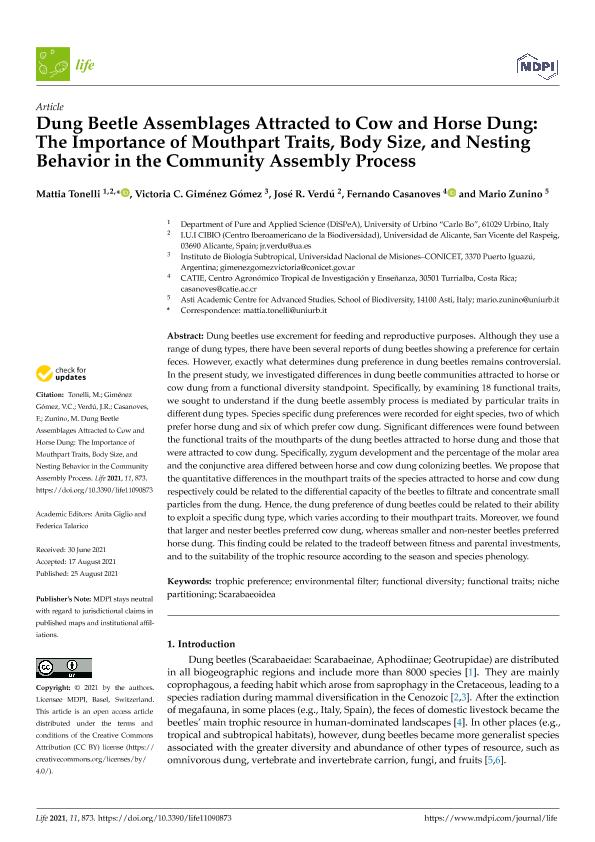Mostrar el registro sencillo del ítem
dc.contributor.author
Tonelli, Mattia
dc.contributor.author
Gimenez Gomez, Victoria Carolina

dc.contributor.author
Verdú, José R.
dc.contributor.author
Casanoves, Fernando

dc.contributor.author
Zunino, Mario
dc.date.available
2022-03-31T11:59:59Z
dc.date.issued
2021-09
dc.identifier.citation
Tonelli, Mattia; Gimenez Gomez, Victoria Carolina; Verdú, José R.; Casanoves, Fernando; Zunino, Mario; Dung beetle assemblages attracted to cow and horse dung: the importance of mouthpart traits, body size, and nesting behavior in the community assembly process; MDPI; Life; 11; 9; 9-2021; 1-13
dc.identifier.uri
http://hdl.handle.net/11336/154106
dc.description.abstract
Dung beetles use excrement for feeding and reproductive purposes. Although they use a range of dung types, there have been several reports of dung beetles showing a preference for certain feces. However, exactly what determines dung preference in dung beetles remains controversial. In the present study, we investigated differences in dung beetle communities attracted to horse or cow dung from a functional diversity standpoint. Specifically, by examining 18 functional traits, we sought to understand if the dung beetle assembly process is mediated by particular traits in different dung types. Species specific dung preferences were recorded for eight species, two of which prefer horse dung and six of which prefer cow dung. Significant differences were found between the functional traits of the mouthparts of the dung beetles attracted to horse dung and those that were attracted to cow dung. Specifically, zygum development and the percentage of the molar area and the conjunctive area differed between horse and cow dung colonizing beetles. We propose that the quantitative differences in the mouthpart traits of the species attracted to horse and cow dung respectively could be related to the differential capacity of the beetles to filtrate and concentrate small particles from the dung. Hence, the dung preference of dung beetles could be related to their ability to exploit a specific dung type, which varies according to their mouthpart traits. Moreover, we found that larger and nester beetles preferred cow dung, whereas smaller and non-nester beetles preferred horse dung. This finding could be related to the tradeoff between fitness and parental investments, and to the suitability of the trophic resource according to the season and species phenology.
dc.format
application/pdf
dc.language.iso
eng
dc.publisher
MDPI
dc.rights
info:eu-repo/semantics/openAccess
dc.rights.uri
https://creativecommons.org/licenses/by/2.5/ar/
dc.subject
ENVIRONMENTAL FILTER
dc.subject
FUNCTIONAL DIVERSITY
dc.subject
FUNCTIONAL TRAITS
dc.subject
NICHE PARTITIONING
dc.subject
SCARABAEOIDEA
dc.subject
TROPHIC PREFERENCE
dc.subject.classification
Ecología

dc.subject.classification
Ciencias Biológicas

dc.subject.classification
CIENCIAS NATURALES Y EXACTAS

dc.title
Dung beetle assemblages attracted to cow and horse dung: the importance of mouthpart traits, body size, and nesting behavior in the community assembly process
dc.type
info:eu-repo/semantics/article
dc.type
info:ar-repo/semantics/artículo
dc.type
info:eu-repo/semantics/publishedVersion
dc.date.updated
2022-03-29T19:03:01Z
dc.identifier.eissn
2075-1729
dc.journal.volume
11
dc.journal.number
9
dc.journal.pagination
1-13
dc.journal.pais
Suiza

dc.description.fil
Fil: Tonelli, Mattia. Universidad de Alicante; España. Università Degli Studi Di Urbino Carlo Bo; Italia
dc.description.fil
Fil: Gimenez Gomez, Victoria Carolina. Consejo Nacional de Investigaciones Científicas y Técnicas. Centro Científico Tecnológico Conicet - Nordeste. Instituto de Biología Subtropical. Instituto de Biología Subtropical - Nodo Puerto Iguazú | Universidad Nacional de Misiones. Instituto de Biología Subtropical. Instituto de Biología Subtropical - Nodo Puerto Iguazú; Argentina
dc.description.fil
Fil: Verdú, José R.. Universidad de Alicante; España
dc.description.fil
Fil: Casanoves, Fernando. Centro Agronómico Tropical de Investigación y Enseñanza; Costa Rica
dc.description.fil
Fil: Zunino, Mario. Asti Academic Centre for Advanced Studies; Italia
dc.journal.title
Life
dc.relation.alternativeid
info:eu-repo/semantics/altIdentifier/doi/http://dx.doi.org/10.3390/life11090873
dc.relation.alternativeid
info:eu-repo/semantics/altIdentifier/url/https://www.mdpi.com/2075-1729/11/9/873
Archivos asociados
